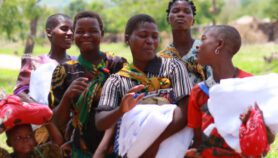15/12/10
Sub-Saharan Africa news in brief: 2–15 December 2010
Send to a friend
The details you provide on this page will not be used to send unsolicited email, and will not be sold to a 3rd party. See privacy policy.
Uganda called to increase science funding
The World Bank said the Ugandan government’s spending on science and technology (S&T) was "inadequate" and called for more funding to help achieve the country’s national development goals. "It is good to have the policy in place, but it should be supported with adequate resources," the bank’s country manager Kundhavi Kadiresan said at a meeting on science policy. "In countries where S&T has evolved, kids are taught right from nursery school to be independent thinkers and given the right environment to learn." More>>
Kenyans protest against EU-India deal on AIDS drugs
Hundreds of HIV-positive Kenyans protested outside European Union’s (EU) offices in Nairobi over a EU–India free-trade agreement they say could jeopardise access to cheap AIDS drugs. A recent UN study found that the agreement could make generics more expensive. The proposed agreement would see patent terms extended beyond 20 years, and Indian manufacturers would need to carry out their own clinical trials instead of using available data. "We depend on these drugs from India because they are cheap and they are very good," said Tom Osongo, 62, a demonstrator. More>>
South Africa launches space agency
South Africa has launched its much-awaited space agency. The South African Space Agency, launched last week (9 December) by science and technology minister Naledi Pandor, will focus on detecting natural disasters and monitoring water resources across the country. It will also bring together experts in the field and strengthen the space sector. The launch comes as Africa considers a continent-wide space agency to help the continent become an important player in the global space programme. More>>
Fast-track Copenhagen pledge, African leaders urge
African climate change negotiators have called for the release of the US$30 billion pledge made in 2009 during the UN Climate Change Conference in Copenhagen, Denmark. The money was intended to help the continent cope with the effects of global warming. Africa’s lead negotiator, Ethiopian prime minister Meles Zenawi, said at this year’s conference in Cancun that richer and industrialised countries should honour the Copenhagen accord and release the funds for adaptation. More>>
Research boost for Angola
A food technology pavilion and microbiology laboratory, launched in Angola last week, is expected to boost research and education in the country. Both were built under existing cooperation between Angola and France, as part of Angola Higher Education Project (Angosup). They are expected to become research and education centres for training staff as part of the higher school of food and technology planned for the northern part of the country. More>>
Africa gets US$31 million to eliminate the river blindness
International donors have committed US$31 million to help Africa eliminate river blindness (onchocerciasis). The trust fund created in 1995 is managed by the World Bank, and supported by donors that include national governments, foundations and the private sector. "We have reached the stage that Africa can get rid of river blindness, and the partnership, with the support pledged today by governments, can make this happen," said Uche Amazigo, director of the WHO’s African Programme for Onchocerciasis Control, based in Ouagadougou, Burkina Faso. More>>
Move beyond climate data to climate advice
Date on climate change should be made more user-friendly, said Jan Egeland, co-chair of the UN high-level taskforce charged with developing guidelines for disseminating climate information. "Simply providing weather data … means nothing to Ana, a small-scale farmer in Mozambique," he said. "We ought to be able to tell her, ‘Don’t plant maize this season, plant cassava; or, plant your maize early." Vulnerable farmers should have access to data interpretation that can help them make a decision on how to adapt to the devastating impacts of climate change, Egeland said. More>>
Rwanda’s science and ICT ambition ‘promising’
Rwanda’s plans to harness science and information and communication technologies (ICT) for prosperity have been hailed promising by Alan Leshner, chief executive officer of the American Association for the Advancement of Science (AAAS). "I discussed with the President the way in which Rwanda has been is using science and technology (S&T) to build the country and it is very impressive that the decision has been made, by the President, to build the country on its brain and use the talent and resources in the country," Leshner said. Minister of education Charles Murigande said the country will work with the AAAS to develop a S&T curriculum for children. More>>
Compiled by Ochieng’ Ogodo. Additional reporting by Munyaradzi Makoni
If you would like to suggest a story for this news in brief, please contact the Africa News Editor Ochieng’ Ogodo ([email protected]).













